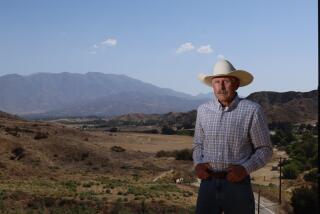Eureka Voters Reject Plan for Wal-Mart
- Share via
In what the victors see as a triumph by David over Goliath, Eureka voters on Tuesday resoundingly defeated a proposal to rezone 32 acres for construction of a Wal-Mart store.
With all 15 precincts reporting, there were 4,015 votes opposing the proposal, and only 2,605 in favor.
The Wal-Mart fight had become a bitter, symbolic struggle over identity and hope in a community whose past was built around logging and fishing and whose future remains uncertain.
For opponents, the proposal to welcome the world’s largest retailer represented an unsettling destiny of low-paying service jobs and the end of a dream to turn the waterfront into a profitable commercial port.
For proponents, the Arkansas-based giant offered jobs, sales tax revenue and a chance--as one resident put it--to buy cheap underwear in a place where bargains are scarce.
The port site, known locally as the “balloon tract” because of its shape, has sat idle for nearly 20 years, since Union Pacific Railroad shut down its engine yards there. The ground was severely polluted by a locomotive repair shop, and any buyer would be obligated to help clean up the mess.
Laura Reneau, who owns a small, upscale clothing boutique in the city’s revitalized Old Town section not far from the proposed Wal-Mart site, opposed Measure J, although she probably would not have had to compete for customers.
“Eureka is unique. The bay is unique. Why put something as common as Wal-Mart on our coastline?” she asked. “If we all spend locally, we build our local economy.”
Becky Solorio of Arcata, who travels 10 miles to Eureka to work as a maid in a hotel, said she had hoped to shop at Wal-Mart. She said she has several unemployed friends who would have been glad to get a Wal-Mart job.
Known for its discount prices and “big-box” stores surrounded by vast parking lots, Wal-Mart, which had sales revenues of $137 billion last year, has run into community opposition before.
In Fort Bragg, for example, Wal-Mart’s expressions of interest prompted opponents to hold a town meeting. The opposition was virulent, and, thus far at least, Wal-Mart has not submitted an official proposal.
Opposition to big-box retailers has become so common across the United States that Al Norman, who helped fight off a Wal-Mart in his native Greenfield, Mass., now advises others on how to block development.
*
Associated Press contributed to this story.
More to Read
Inside the business of entertainment
The Wide Shot brings you news, analysis and insights on everything from streaming wars to production — and what it all means for the future.
You may occasionally receive promotional content from the Los Angeles Times.










